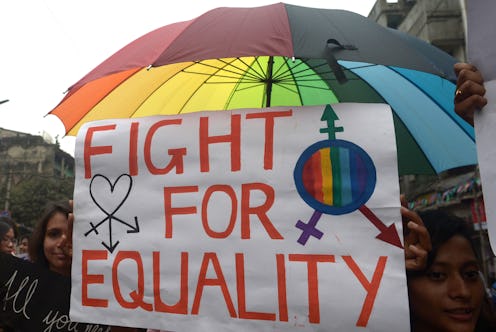It's been almost seven months since marriage equality for same-sex couples became the law of the land here in the United States. After the ruling came down last summer, a lot of people began experiencing more rights, recognition, and protections, and that's absolutely worth celebrating. On the other hand, though, marriage equality made progress under a relatively small umbrella, compared to the broad spectrum of issues which affect the LGBTQ community. As Zach Stafford at The Guardian points out, "The honeymoon is over," and it's time for us to think about issues that continue affect the LGBT community aside from marriage equality — and what we can do to help.
Pulling data from the second annual Accelerating Acceptance report, recently released from GLAAD, Stafford points out that, since the passage of marriage equality, 50 percent of Americans think gay people have the same rights as everybody else. As Stafford explains, that's actually a huge and problematic misconception. How come? The reality is that marriage equality offers many rights and protections to married same-sex couples, which is a great thing, but it does not extend to issues beyond that.
Marriage equality, for example, does not provide employment protection, anti-discriminatory housing laws, or resources for LGBTQ youth. But approaching these issues with the same aims we did for marriage equality — to inform, educate, and mobilize the public into action — might help bring about the change, both structural and ideological, we need. As Stafford says, "We failed when we allowed for marriage to continually be our white horse," meaning, essentially, that as activists, we can't expect all other issues to be branched under marriage equality and hope for the best.
Here are other serious issues affecting the LGBTQ population, and how to help:
1. Employment Protections
You can still be fired for being LGBTQ in a lot of places. Yup. Shocking, but true: In 27 states that you can be fired for being gay, and in 32 states you can be fired for being transgender. As the Human Rights Campaign explains, "Even after a marriage victory at the Supreme Court, in most states in this country, a couple who gets married at 10 a.m. remains at risk of being fired from their jobs by noon and evicted from their home by 2 p.m. simply for posting their wedding photos on Facebook."
One might assume that because we have marriage equality, there's no way people could still be fired for being "out" at work. Unfortunately, because there are big patches in legal protections, it's possible for a same-sex couple to legally get married... and just as legally lose their jobs.
2. Housing Protections
Many advocates agree that the next frontier for LGBTQ equality concerns housing protections. Similar to the need for employment protections, the need for housing protections hinges on the fact that while you can legally marry your partner, you may be out of luck when it comes to finding a place to live.
If you identify as transgender, the obstacle can be even worse: One out of five transgender people in the United States have been discriminated against when trying to find housing according to the National Center for Transgender Equality, and one out of 10 have been evicted from their homes because of their gender identity. Many advocates agree that the solution is to work towards local, state, and federal laws which guarantee protection against discriminatory housing practices.
3. Medical Care
Access to fair, safe, and adorable medical care is a big topic of conversation, if you're LGBTQ identified or otherwise. While the cost and availability of medical treatment is an obstacle for most of us, obtaining access to medical care if you're transgender can be a wildly difficult and frustrating experience. There are horror stories of doctors who refuse to treat transgender people and of medical staff allegedly treating transgender people like freak shows while waiting to be seen in the ER.
Many transgender people also experience misgendering when seeing medical professionals. Basically, this means that staff refuse to use patients' preferred names and pronouns, and instead insisting on using what they were assigned at birth. This may even happen to transgender people after they acquire name affirming paperwork, which is amazingly frustrating. Possible routes to better health care for the LGBTQ population include easier access and affordability and training on LGBTQ issues.
4. The Youth
Kids and teens who identify as queer face their own unique obstacles. For example, lesbian, gay, and bisexual youth are four times more likely to attempt suicide than their heterosexual peers. For transgender youth, the number is even scarier: nearly half report seriously considering suicide, and one in four attempt it. Nearly one quarter of LGBT youth report being physically attacked at school. For youth who come out to their parents, roughly half experience a negative reaction, and the loss of familial support can be devastating. For young people who are coming out, acceptance and support are key.
All of this said, we've made huge movements forward in recent years when it comes to LGBTQ equality. I do think marriage equality opened up the discussion of equality in a powerful and positive way, but like Stafford, I hope to see activism and passion continue on for the other issues affecting the queer population.
Images: Giphy (4)
